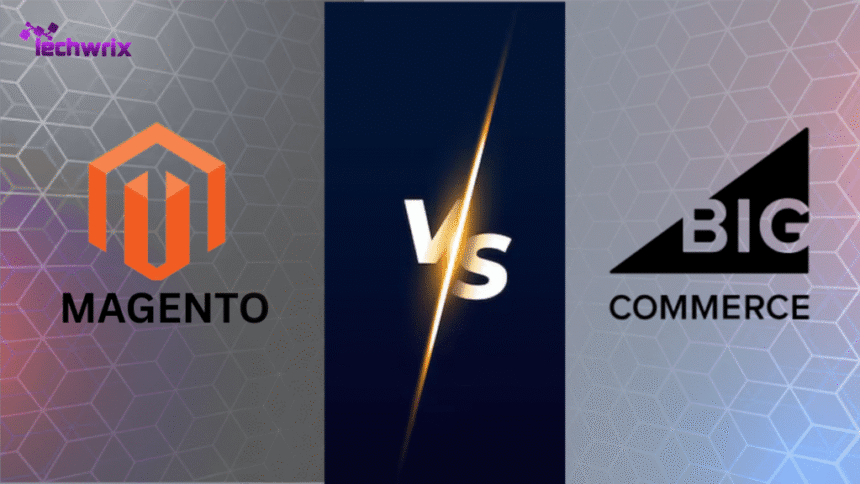Choosing the most suitable eCommerce platform is certainly the key to online business success. Magento and BigCommerce comparisons rule the market by providing distinctive abilities. The entire Magento vs. BigCommerce comparison is more tangible than ever as organizations seek scalable, high-performance solutions.
Magento presents leading personalization and enterprise-grade features. It is better suited for intricate, large-volume stores. BigCommerce, on the other hand, offers a straightforward solution with powerful, pre-installed capabilities that enable rapid deployment.
Also Read: The Hidden Costs of Building vs. Buying Software for Your B2B Startup
Understanding Magento and BigCommerce
The decision on Magento or BigCommerce may not be easy to make since both platforms are robust eCommerce platforms with different features and benefits. BigCommerce has the easiest and most user-friendly hosted solution to use, and Magento has the most flexible customization settings with the most tech-savvy business entrepreneurs.
BigCommerce
BigCommerce is an e-commerce platform that hosts the service online and is an all-in-one, complete package solution for businesses of all sizes. It is also reliable when it comes to scaling and in-built functionalities, hence an ideal app in firms seeking to avoid technical issues.
Major Features of BigCommerce:
- Completely hosted, reducing the need for individual web hosting.
- Simple interface with drag-and-drop functionality.
- Smooth integration with top payment gateways.
- Powerful SEO tools to enhance search engine rankings.
- Multiple selling capabilities, like Amazon, eBay, and social sites.
- Very good built-in security with PCI compliance.
- No transaction charges (other than gateway-specific fees).
- 24/7 technical support.
Magento (Adobe Commerce)
Magento is an open-source, self-hosted online shop that will provide customization in full. Magento has unlimited flexibility and is suitable for businesses and enterprises that have in-house development teams.
Major Features of Magento:
- Full power to change the site’s look and make it do what you want.
- They give a free version for folks who build.
- Top-level control for managing lots of products.
- A large marketplace of third-party integrations and extensions.
- Scalable solutions for growing businesses.
- Robust SEO capabilities and marketing automation features.
- Self-hosted, with separate hosting and maintenance needs.
- Enterprise-level security features.
Magento vs. BigCommerce: A Detailed Analysis
One should also be aware of the capabilities, size, and customizability of the eCommerce platform before selecting the relevant eCommerce platform. The enterprises that want to achieve full control and customized solutions usually hire Magento developers, who can explore the full features of the platform. Other business owners see that BigCommerce is easier to use and ready to go.
- Ease of Use
Magento: This is good for groups with tech skills or those who can get a coder. Magento has great tools, but it’s hard to use as it needs a lot of technical skills and time to set it up.
BigCommerce: This tool is made for easy use for those who don’t have tech skills. Non-technical users can set up and easily navigate the BigCommerce dashboard; no coding is required for most store setups.
- Design Customization
Magento: Offers complete design freedom through customizable themes, with limitless code-level modification. Of the three platforms, Magento can create a single store.
BigCommerce: Excellent when you need something out of the box; most of the time, you are able to set up a store within a short period using the built-in theme editor and predefined ready-to-go templates, which you can modify. BigCommerce is adjustable, yet it is not going to be as comprehensive as Magento Open Source.
- Performance and Growth
Magento: Often seen as the better choice for big businesses with lots of items, stores that sell many things, and lots of web visits. How well it works depends on how good the hosting is and how well it’s set up.
BigCommerce: Grows well without the need to handle servers since it works in the cloud. It deals with big leaps in web traffic on its own.
- SEO Capabilities
Magento: Strong SEO skills, lets you handle URLs, metadata, and structured data yourself. You need to set it up manually to get the best out of it.
BigCommerce: Comes with main tools for SEO support, like automatic sitemaps, improved URL styles, and designs ready for mobiles without extra coding.
- Payment Gateway Support
Magento: Works with a lot of gateways through add-ons, covering both global and local ones. Might need some work to mix.
BigCommerce: Links up with over 65 payment gateways right away, sets up quickly, and has no fees for each sale (just the fees the gateways set).
- Integrations & Extensions
Magento: A huge-scale marketplace with thousands of extensions of CRM, ERP, marketing, and analytics. The quality of the hosting and optimization is the basis of performance.
BigCommerce: It is highly scalable and doesn’t require management of a server, as it is cloud-based.
- Security Features
Magento: Enterprise-grade security with custom SSL certificates, two-factor authentication, and regular patches. Security depends on proper configuration.
BigCommerce: Provides PCI Level 1 certified security, meaning it provides automatic updates, SSL, and built-in DDoS protection. All are completely handled through the platform itself.
- Mobile Friendly
Magento: It provides responsive themes, but still majorly depends on which type of responsive theme you are using and how well you have optimized it.
BigCommerce: Every theme is mobile category by default, making it consistent on any device.
Magento vs. BigCommerce – Which is Best for Different Types of Businesses?
The Magento vs. BigCommerce decision is usually based on size and business needs. Where Magento has unlimited levels of customization and scalability for more sophisticated organizations, BigCommerce has a level of ease and speed for those who care about simplicity. Developing the knowledge of which specific platform works best for your business growth phase can save a lot of time, money, and energy.y
Startups & Small Businesses
BigCommerce is more of a newbie-friendly solution for startups in general. Its hosting does not require the need to manage servers or extensive technical knowledge. New software can also save on costs and time since prefabricated templates can be installed in companies within a short period. Heavy customization may be too overwhelming to take on with small teams that lack internal developers, taking into consideration that Magento is more complex.
Growing SMEs
In Magento, SMEs, which have a growing number of product catalogs and customization needs, have greater maneuverability. Since it is an open-source technology, plenty of tweaking, personal branding, and integration with in-house business software are possible.
BigCommerce is still a good pick for small and mid-size firms that like easy control more than deep changes.
Large Enterprises & Global Brands
Magento leads when a company needs lots of features, runs more than one store across the world, and wants complex links. It can handle many stores and big expansions well, making it ideal for large items and worldwide sales.
BigCommerce also works for big stores, but may lack when it comes to making a lot of changes, unlike Magento.
Pricing Breakdown Between Magento and BigCommerce
Comparing Magento and BigCommerce factors like pricing contributes a lot to decision-making. Both platforms subscribe to varying cost plans, where Magento tends to demand increased spending of resources in hosted and development plans, whereas BigCommerce provides options of fixed monthly plans inclusive of hosting. These differences in understanding aid businesses in matching the platforms with their budget.
Magento
Open Source: Free to get started, but you’ll need to pay for hosting, security, a domain, and most importantly, development.
Adobe Commerce: Begins at approximately $22,000 annually, with enterprise-level features and hosting.
BigCommerce
Standard Plan: $39/month (Perfect for new shops.)
Plus Plan: $105/month (Includes improved marketing tools.)
Pro Plan: $399/month (For bigger, expanding shops)
Enterprise: Flexible pricing scales with your sales.
What’s Next for Magento and BigCommerce in 2025?
Magento and BigCommerce are changing fast! They’re adding cool, new stuff to keep up with what online stores need. Just imagine AI personalising shopping, headless commerce, and means of selling anywhere. Being familiar with what to expect will enable you to make the right choice in 2025.
AI Personal Shopping
Magento and BigCommerce are using AI to make shopping special for everyone. Expect smarter suggestions, content that changes just for you, and tracking what customers do as they shop.
Headless Commerce is Here
Headless commerce will be everywhere in 2025. Magento is great if you want to build your own front-end experience. BigCommerce has easier API tools if you want to try headless.
Selling Everywhere
Shoppers want things to be easy, no matter where they are – online, in a store, or on social media. Both platforms are getting better at this. Magento is good for big businesses with lots of ways to sell. BigCommerce is easier for smaller teams to set up.
Picking the Best Platform
Choosing between BigCommerce and Magento depends on what you want, how much you want to spend, and how technical you are. If you want to get online fast, hire BigCommerce developers to set things up. If you need something powerful and custom, Magento might be better.
Business Goals Alignment
In case you are looking to get rapid store release and want fewer technology difficulties, then your best bet could be BigCommerce. Where it is, in case you want a completely free designing option and a customised workflow, it is Magento.
Budget Factors
BigCommerce pricing is consistent, including hosting, security, and updates. There is increased hosting, coding, and maintenance investment required in Magento, but also more control and flexibility.
Technical Knowledge Needs
BigCommerce is best for non-tech users. Magento is technical; hence, it is only suitable for teams that have a developer or for agencies that will manage the store.
Conclusion
BigCommerce is simpler to install, has fewer technical requirements, and has predictable expenses. Magento is awesome when you need a ton of control and your company is large or convoluted. However, when you are still starting out or only have a small group, it is most likely that BigCommerce will be simpler and quicker to set up. As a more established brand and a larger brand, when you have the desire to make a lot of customization and grow in the future, Magento will be excellent. Still not sure? Take into consideration the size of your business, what you can invest, and to what degree you are technologically advanced. A reliable e-commerce development company can help you maximize whatever platform you decide to choose.
Visit Techwrix, we provide expert insights and unbiased comparisons to help businesses choose the right technologies for growth and long-term success.
















